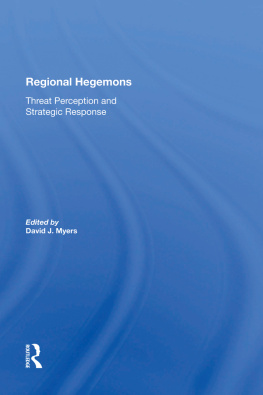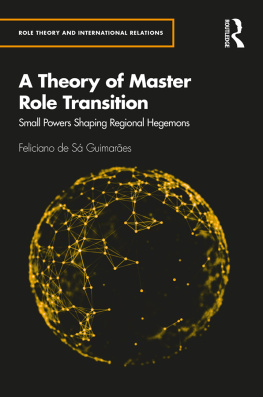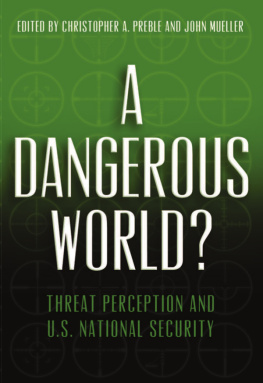Regional Hegemons
Regional Hegemons
Threat Perception and Strategic Response
EDITED BY
David J. Myers
First published 1991 by Westview Press
Published 2019 by Routledge
52 Vanderbilt Avenue, New York, NY 10017
2 Park Square, Milton Park, Abingdon, Oxon OX14 4RN
Routledge is an imprint of the Taylor & Francis Group, an informa business
Copyright 1991 by Taylor & Francis
All rights reserved. No part of this book may be reprinted or reproduced or utilised in any form or by any electronic, mechanical, or other means, now known or hereafter invented, including photocopying and recording, or in any information storage or retrieval system, without permission in writing from the publishers.
Notice:
Product or corporate names may be trademarks or registered trademarks, and are used only for identification and explanation without intent to infringe.
Library of Congress Cataloging-in-Publication Data
Regional hegemons: threat perception and strategic response / edited
by David J. Myers.
p. cm.
Includes bibliographical references and index.
ISBN 0-8133-8155-X
1. Regionalism (International organization). 2. Developing
countriesNational security. 3. Iraq-Kuwait Crisis, 1990
I. Myers, David J.
JX1979.R3918 1991
327.1'14dc20 91-6736
CIP
ISBN 13: 978-0-367-28546-3 (hbk)
The bitter U.S. experience in Vietnam and the pain inflicted on the Soviet Union by its Afghanistan adventure have caused Washington and Moscow to rethink the costs and benefits of unilateral military intervention on behalf of threatened clients, especially in the third world. Also, as the Cold War winds down, the crusading spirit that has driven superpower competition since the end of World War II appears increasingly anachronistic. Expenditures by the superpowers in pursuit of military superiority, or even to ensure parity, are now criticized for the security they do not provide or for detracting from economic growth. The latter criticism has grown in importance as the U.S. economy has confronted new challenges from Japan and Germany and as the Soviet economy struggles to avoid collapse. Thus when Saddam Hussein's August 1990 invasion of Kuwait challenged the political and economic status quo in the oil-rich Middle East, neither the United States nor the Soviet Union responded unilaterally. Cooperatively they crafted an international consensus to confront the challenge.
The Persian Gulf Crisis of 1991 was perhaps the most dramatic of many recent events underscoring the need to move beyond preoccupation with bipolarity and superpower competition. The relative decline in U.S. and Soviet power since the middle 1970s has mandated an examination of alternative international relations paradigms. In this context an important pioneering effort was the volume edited by Rodney W. Jones and Steven A. Hildreth, Emerging Powers: Defense and Security in the Third World. Jones and Hildreth analyzed the new importance of states whose interests had been overridden or submerged in the bipolar international order; their concerns led me to organize a panel on "Threat Perception and Strategic Response of the Regional Powers" for the 1988 annual conference of the Northeast Political Science Association at Providence, Rhode Island.
This volume is an outgrowth of that panel. It begins with the premise that the late twentieth-century decline in capability (most notably that of the United States and the Soviet Union) to project power simultaneously into several major geopolitical arenas has permitted governments desirous of special local influence to pursue long-suppressed aspirations. The volume's focus is on a distinctive kind of regional international system, one possessing a powerful state with aspirations of regional hegemony. Discussion and analysis probe how such states perceive threats to their regional aspirations and respond to them. Significant differences emerge in how perceptions crystallize and how responses are chosen; they appear to depend, in large measure, on whether the aspirants are superpowers, pariahs or upwardly mobile third-world states.
There are three parts to this study. The first, an overview chapter, pulls together the most important thinking about threat perception and strategic response. The second, the volume's core, revolves around seven regional international systems in which a powerful state seeks special influence. These are: the Caribbean Basin (United States); Southern Africa (South Africa); the Middle East (Israel); South Asia (India); Southeast Asia (China); South America (Brazil); and West Africa (Nigeria). The concluding chapter integrates into a broad, interactive model the overview and insights from examination of the seven hegemon-centered, regional international systems. In so doing it identifies and analyzes the critical structures and processes common to aspiring regional hegemon threat perception and strategic response. Also discussed are the most important differences between superpower aspirants, pariah aspirants and third-world aspiring hegemons. This analysis contributes toward revitalization of an orientation that is especially helpful for understanding international structure and processes as bipolarity dissolves.
Edited volumes demand close and sustained cooperation between editor and contributors. This study was no exception; individual chapter authors commented generously in ways that improved the integrating framework. Any shortcomings that remain, however, are the responsibility of the editor. Special thanks are due to Dean David Palermo of the Penn State University College of Liberal Arts Research Office and the Department of Political Science. Their funding, of assistance for content analysis, travel, and manuscript preparation, made this volume possible. Carol Spotts is to be commended for her care in preparing the manuscript. I also would like to acknowledge the editorial assistance of Hillary Pops and the encouragement of acquisitions editor Peter Kracht, both of Westview Press. Finally, I owe much to my wife, Cynthia Theresa Myers. Her support and interest in the project speeded it to completion, and it is to her that I dedicate this volume.
David J. Myers
Notes
Westport, CT: Greenwood/Praeger, 1986.
Threat Perception and Strategic Response of the Regional Hegemons: A Conceptual Overview
David J. Myers
The global character of World War II focused international politics on issues that transcended local balances of power. There was some recognition that regional issues and perspectives remained important, but they were viewed as second-order problems. During the 1970s, however, limited wars and low-intensity conflicts revealed unanticipated limits on the exercise of superpower influence. Neither Washington nor Moscow seemed capable of simultaneously dominating more than a few regional or subordinate state systems. As of July 1990, at the Houston economic summit, the situation had changed so dramatically that an aid to President George Bush bluntly proclaimed "The age of the superpowers is obviously over."
Regional geopolitical systems crystallize when over time the actions of states suggest that their foreign policy elites (and those of most external powers) perceive that a system does indeed exist. Role theorists would term this agreement on one of many international positions (or series of international prescriptions) and assign each nation a corresponding status in relation to it.global competition between the United States and the Soviet Union to gain allies and control natural resources. Most notable were the Middle East and Southeast Asia. Others served as secure preserves facilitating the global projection of superpower influence. In this latter context, the Caribbean Basin and Eastern Europe immediately come to mind.













